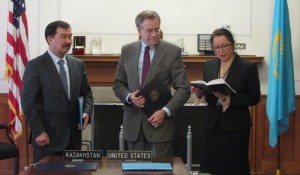WASHINGTON, DC – Askhat Daulbayev, Prosecutor General of Kazakhstan, and Bruce C. Swartz, U.S. Deputy Assistant Attorney General, signed the Treaty on Mutual Legal Assistance in Criminal Matters (MLAT) on Feb. 20 at the U.S. Department of Justice.
The treaty, after it is ratified by both countries’ legislatures, will significantly boost cooperation between the nations and aid them in tackling crime more effectively.
Kairat Umarov, Kazakhstan’s Ambassador to the United States, called the signing of the MLAT “a milestone achievement” in the two countries’ bilateral relations.
Indeed, with the conclusion of the agreement, Kazakhstan becomes one of only three post-Soviet countries (besides Russia and Ukraine) and the first in Central Asia to codify the exchange of evidence and information in criminal and related matters through a MLAT with the United States.
“The signing of this treaty marks an important step forward by the United States and Kazakhstan to enhance law enforcement cooperation and to protect the law-abiding citizens of both countries,” the U.S. State Department said in a press release.
“Kazakhstan sees the signing of the MLAT as eloquent evidence of the strengthening of the bond of friendship and strategic cooperation between our two countries,” said Umarov.
The country’s top diplomat in Washington also added that the treaty “will add to Kazakhstan’s attraction as a premier jurisdiction for international business and investment” because “it is good for business, commerce and, of course, it will help bring criminals to justice.”
Officials from Kazakhstan’s Ministry of Foreign Affairs and the Prosecutor General’s Office conducted the treaty negotiations with their American counterparts in the U.S. Department of State and the U.S. Department of Justice.
The MLAT is a treaty-based mechanism for seeking foreign law enforcement cooperation and assistance in support of ongoing criminal investigations or proceedings. The MLAT and its benefits are available only to government officials, typically prosecutors. Under the treaty, assistance can be provided in taking the testimony of witnesses, releasing documents and records, locating and identifying persons or evidence, serving documents, executing requests for searches and seizures, transferring persons in custody for testimony or other purposes, tracing and forfeiting the proceeds of crime and any other form of assistance not prohibited by the laws of the requested state. The United States has negotiated such treaties since the late 1970s and currently has over 70 in force.


